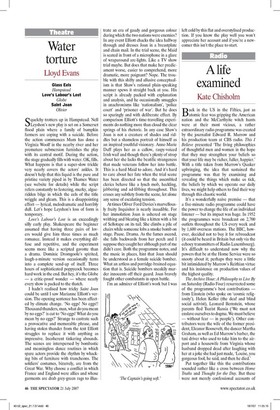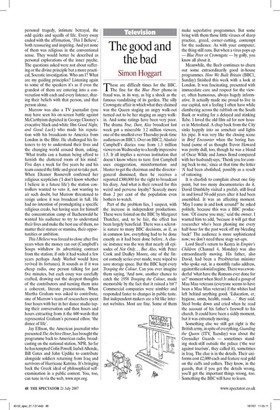A life examined
Kate Chisholm -pack in the US in the Fifties, just as LI atomic fear was gripping the American nation and the McCarthyite witch hunts were at their most vicious, a rather extraordinary radio programme was created by the journalist Edward R. Murrow and his production team at CBS radio. This I Believe presented 'The living philosophies of thoughtful men and women in the hope that they may strengthen your beliefs so that your life may be richer, fuller, happier.' With a title taken from Murrow's Quaker upbringing, the idea that sustained the programme was that by examining and revealing the things which make us tick, the beliefs by which we operate our daily lives, we might help others to find their way through this chaotic world.
It's a wonderfully naive premise — that a five-minute radio programme could have the power to change the life of an individual listener — but its impact was huge. In 1952 the programmes were broadcast on 2,700 outlets throughout the US every week and by 1,600 overseas stations. The BBC, however, decided not to buy it for rebroadcast (it could be heard in Britain but only via the echoey transmitters of Radio Luxembourg). It's difficult to understand now why the powers that be at the Home Service were so snooty about it; perhaps they were a little bit intimidated by Murrow's Reithian virtue and his insistence on production values of the highest quality.
The Archive Hour: A Philosophy to Live By on Saturday (Radio Four) resurrected some of the programme's best contributions — from Einstein (who spoke on 'cosmic religiosity'), Helen Keller (the deaf and blind social activist), Leonard Bernstein, whose parents fled Tsarist Russia ('We must not enslave ourselves to dogma. We must believe — without fear — in people'). Other contributors were the wife of the former president, Eleanor Roosevelt, the dancer Martha Graham, as well as Ed Murrow's barber, the taxi driver who used to take him to the airport and a housewife from Virginia whose husband dropped dead after laughing with her at a joke she had just made, 'Louise, you gorgeous fool, he said, and then he died.'
Put together like this the contributions sounded rather like a cross between Home Truths and Thought for the Day. But these were not merely confessional accounts of personal tragedy, intimate betrayal, the odd quirks and squalls of life. Every essay ended with the affirmation, 'This I Believe', both reassuring and inspiring. And yet none of them was religious in the conventional sense. They would better be described as personal explorations of the inner psyche. The questions asked were not about suffering or the divine principle but a more practical, Socratic investigation. Who am I? What are my guiding principles? Listening again to some of the speakers it's as if even the grandest of them are entering into a conversation with each and every listener, sharing their beliefs with that person, and that person alone.
Murrow was also a TV journalist (you may have seen his on-screen battle against McCarthyism depicted in George Clooney's evocative black-and-white film Good Night, and Good Luck) who made his reputation with his broadcasts to America from London in the Blitz. He challenged his listeners to try to understand their lives and the changing world around them, asking, 'What truths can a human being afford to furnish the cluttered room of his mind.' Five days a week for five years he and his team coaxed the little and great to take part. When Eleanor Roosevelt confessed her religious scepticism (I don't know whether I believe in a future life') the station controllers wanted to veto it, not wanting to air such doubt, but Murrow threatened to resign unless it was broadcast in full. He had no intention of promulgating a specific religious credo, but having seen for himself the concentration camp of Buchenwald he wanted his audience to try to understand their lives and make the best use of them, no matter their stature or stamina, their opportunities or ambition.
This I Believe was forced to close after five years when the money ran out (Campbell's Soups withdrew its advertising contract from the station; if only it had waited a few years perhaps Andy Warhol would have revived its fortunes). It sounds as if it was cheap radio, one person talking for just five minutes, but each essay was carefully crafted, drawing out the deepest thoughts of the contributors and turning them into a coherent, literate presentation. When Martha Graham was asked to contribute, one of Murrow's team of researchers spent four hours with her in her dance studio taping their conversation and then hours and hours extracting from it the 600 words that represented Graham's personal ethos: `the dance of life'.
Jay Ellison, the American journalist who presented The Archive Hour, has brought the programme back to American radio, broadcasting on the national station, NPR. So far he has tempted Cohn Powell, Isabel Allende, Bill Gates and John Updike to contribute alongside soldiers returning from Iraq and survivors of Hurricane Katrina. It's bringing back the Greek ideal of philosophical selfexamination in a public context. You, too, can tune in via the web, www.npr.org.













































 Previous page
Previous page